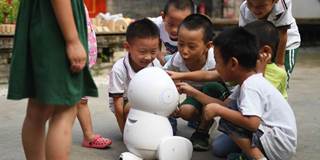Technologies powered by artificial intelligence are being applied to some of the world’s most challenging human-development issues. But while AI has considerable potential to serve the public good, key bottlenecks – from education to risk reduction – must be overcome.
SAN FRANCISCO – The excitement surrounding artificial intelligence nowadays reflects not only how AI applications could transform businesses and economies, but also the hope that they can address challenges like cancer and climate change. The idea that AI could revolutionize human wellbeing is obviously appealing, but just how realistic is it?
To answer that question, the McKinsey Global Institute has examined more than 150 scenarios in which AI is being applied or could be applied for social good. What we found is that AI could make a powerful contribution to resolving many types of societal challenges, but it is not a silver bullet – at least not yet. While AI’s reach is broad, development bottlenecks and application risks must be overcome before the benefits can be realized on a global scale.
To be sure, AI is already changing how we tackle human-development challenges. In 2017, for example, object-detection software and satellite imagery aided rescuers in Houston as they navigated the aftermath of Hurricane Harvey. In Africa, algorithms have helped reduce poaching in wildlife parks. In Denmark, voice-recognition programs are used in emergency calls to detect whether callers are experiencing cardiac arrest. And at the MIT Media Lab near Boston, researchers have used “reinforcement learning” in simulated clinical trials involving patients with glioblastoma, the most aggressive form of brain cancer, to reduce chemotherapy doses.

SAN FRANCISCO – The excitement surrounding artificial intelligence nowadays reflects not only how AI applications could transform businesses and economies, but also the hope that they can address challenges like cancer and climate change. The idea that AI could revolutionize human wellbeing is obviously appealing, but just how realistic is it?
To answer that question, the McKinsey Global Institute has examined more than 150 scenarios in which AI is being applied or could be applied for social good. What we found is that AI could make a powerful contribution to resolving many types of societal challenges, but it is not a silver bullet – at least not yet. While AI’s reach is broad, development bottlenecks and application risks must be overcome before the benefits can be realized on a global scale.
To be sure, AI is already changing how we tackle human-development challenges. In 2017, for example, object-detection software and satellite imagery aided rescuers in Houston as they navigated the aftermath of Hurricane Harvey. In Africa, algorithms have helped reduce poaching in wildlife parks. In Denmark, voice-recognition programs are used in emergency calls to detect whether callers are experiencing cardiac arrest. And at the MIT Media Lab near Boston, researchers have used “reinforcement learning” in simulated clinical trials involving patients with glioblastoma, the most aggressive form of brain cancer, to reduce chemotherapy doses.